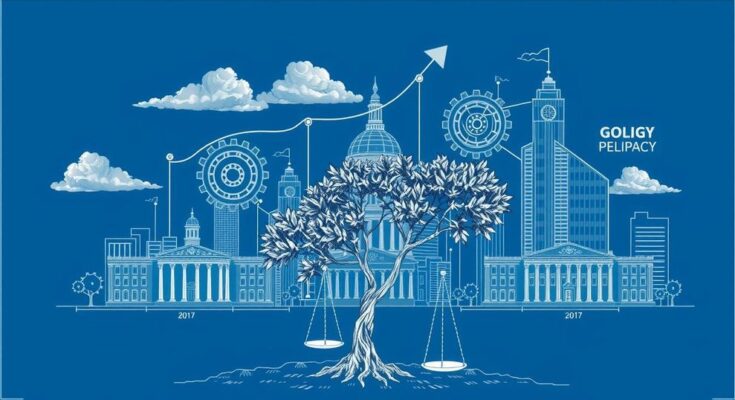The article critiques the economic policies of Donald Trump and Kamala Harris for prioritizing redistribution over efficiency. It argues that their proposed tariffs, immigration policies, tax codes, and social programs would harm long-term economic growth. The authors call for a reorientation of policy focus toward efficiency to promote overall economic prosperity and equity.
Economic policies usually aim for either efficiency, which grows the economic pie, or redistribution, which reallocates it. Unfortunately, many politicians prioritize redistribution, often damaging long-term growth. Presidential candidates, including Kamala Harris and Donald Trump, lean toward these redistributive measures, particularly in tariffs, trade, and taxation, contradicting the need to maximize economic performance and efficiency in their platforms. Tariffs uplift costs for consumers and businesses, ultimately hurting the economy. Tariffs not only inflate prices but also invite retaliatory measures from other countries, worsening trade situations, as seen in past events like the Smoot-Hawley tariffs and the recent tensions with China. These policies seem crafted to attract specific voting groups rather than promote economic health. Increasing legal immigration avenues will bolster the labor market, reducing production costs and enhancing innovation. Current positions against immigration, particularly Trump’s hardline stance, could raise costs for U.S. businesses and disrupt the economy. As immigrants seek better living conditions, government resistance to immigration serves only to hinder economic expansion. An efficient tax code should minimize complications and treat similar incomes equally. Current proposals from both Harris and Trump to create exceptions in the tax code disregard efficiency objectives. Long-term economic health suggests a corporate tax rate ideally structured to encourage investment, rather than penalize it with higher rates and different treatments for varying business types. Politicians frequently advocate for home ownership through subsidies, mistakenly thinking they address market failures. Rather, easing local land use restrictions could enhance housing accessibility and lower prices. Realistic policies shouldn’t incentivize home ownership at the expense of broader economic efficiency but focus instead on managing housing supply effectively. Historical support for industrial policy often leads to misguided government intervention in market outcomes. While manufacturing challenges persist, redirecting resources to prop up certain sectors only decreases efficiency by misallocating resources. A hands-off approach respects market mechanisms and allows successful industries to thrive without governmental favoritism. Fiscal sustainability requires long-term balancing of government spending against revenue capabilities. Unsustainable entitlement programs must be revisited for adjustment to promote future economic stability, highlighting the need for reform in Social Security and Medicare rather than support for expanded benefits. Without reform, fiscal crises loom on the horizon. Education subsidies are often politically motivated rather than economically sound. Federal spending on education, particularly through student loans, raises concerns about actual returns on these investments. Loan forgiveness initiatives, while appealing, signal poor decision-making in future borrowing, leading to undesirable economic behavior in the long term. Policymaking on issues like climate change should prioritize economic efficiency. Proposals like carbon taxes could lead to effective environmental benefits, yet Harris’s reliance on energy subsidies tends to reduce energy costs, thus inadvertently increasing fossil fuel usage. Political motivations often cloud genuinely efficient economic policy considerations, leading to misguided interventions. A reconsideration of policies across the board—from antitrust laws to minimum wage regulations—reveals numerous inefficiencies rooted in current practices. The political agenda typically favors temporary gains for specific groups rather than fostering broad economic growth through efficiency. With a rejuvenated focus on efficiency, policymakers could enhance both productivity and equity, setting the stage for a healthier economic future.
The article discusses the implications of economic policies proposed by major political candidates, emphasizing the need for a shift from redistribution to efficiency. It critiques the current focus on redistributing wealth and resources, arguing that policies based on efficiency can lead to long-term benefits for the economy as a whole. By examining specific policy areas like tariffs, immigration, and taxation, the authors make a case for prioritizing efficiency in policymaking.
Both candidates’ policies focus more on resource redistribution than on creating a favorable economic environment. The article argues for a paradigm shift that emphasizes efficiency and productivity, which could result in a more robust and equitable economy. Moving forward, a commitment to efficiency in policymaking will not only enhance economic growth but also ensure fairness across all demographics, ultimately benefiting society as a whole.
Original Source: www.promarket.org



